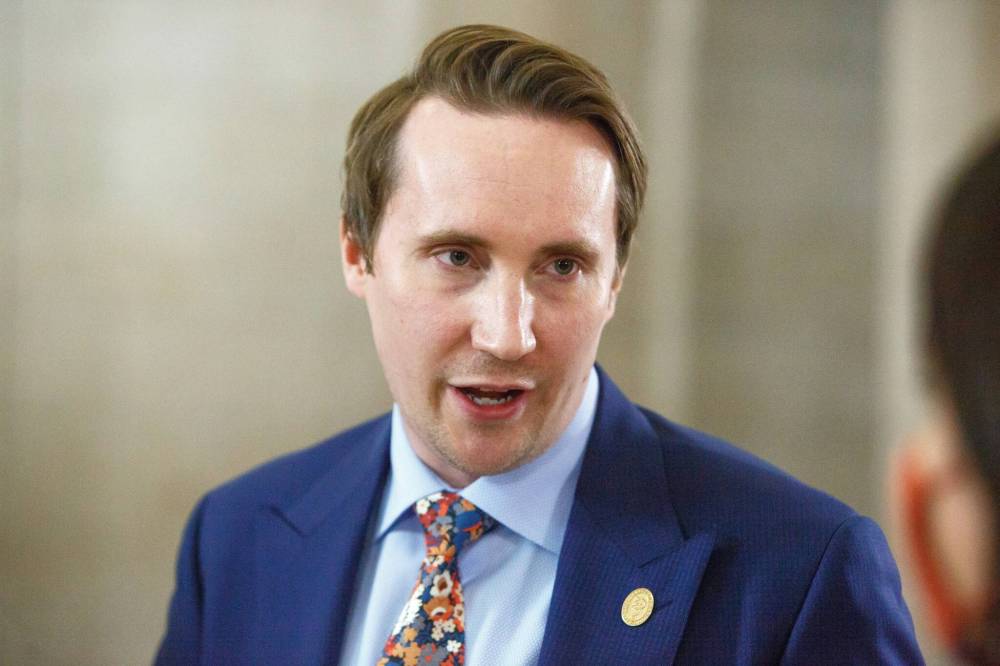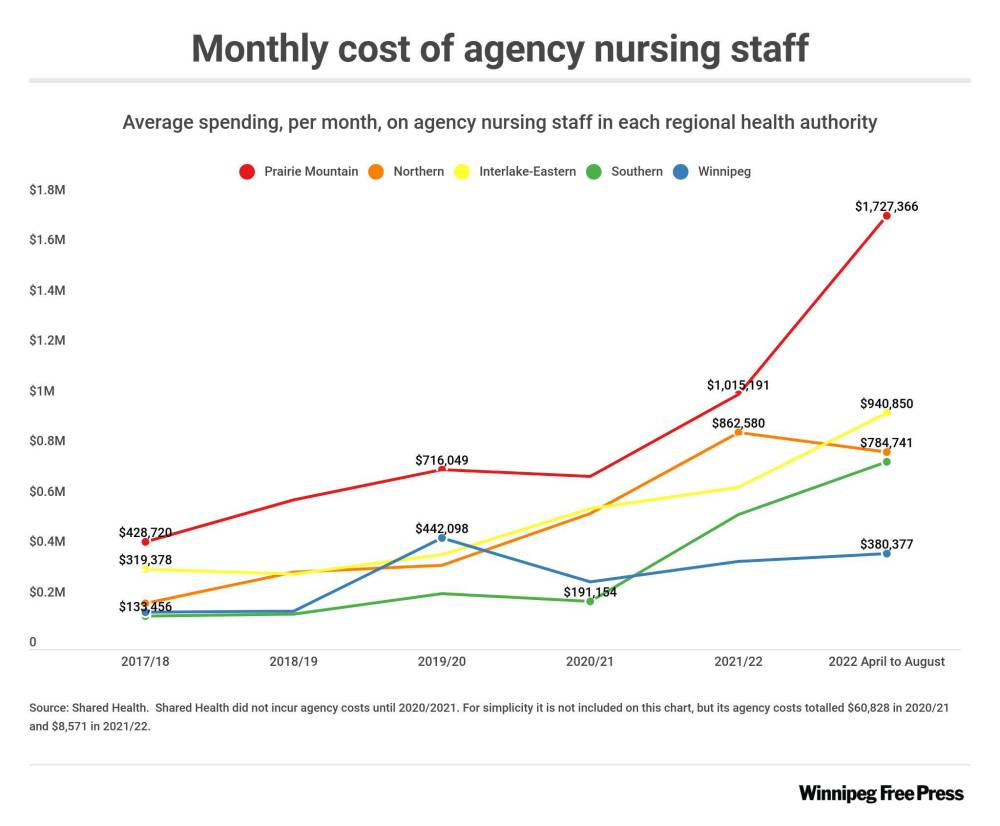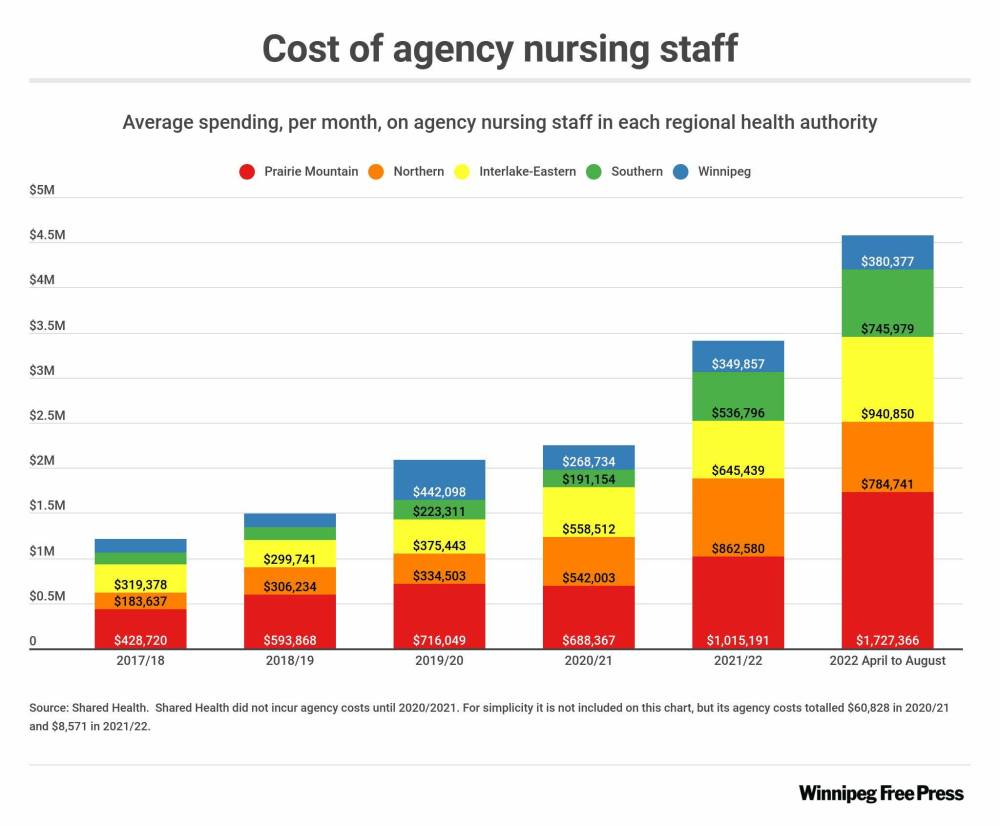Illness, burnout force RHAs to lean more heavily on private-agency nurses Monthly spending in province up 34 per cent over last year to cover vacancies and absences, Shared Health data shows
Read this article for free:
or
Already have an account? Log in here »
To continue reading, please subscribe:
Monthly Digital Subscription
$0 for the first 4 weeks*
- Enjoy unlimited reading on winnipegfreepress.com
- Read the E-Edition, our digital replica newspaper
- Access News Break, our award-winning app
- Play interactive puzzles
*No charge for 4 weeks then price increases to the regular rate of $19.00 plus GST every four weeks. Offer available to new and qualified returning subscribers only. Cancel any time.
Monthly Digital Subscription
$4.75/week*
- Enjoy unlimited reading on winnipegfreepress.com
- Read the E-Edition, our digital replica newspaper
- Access News Break, our award-winning app
- Play interactive puzzles
*Billed as $19 plus GST every four weeks. Cancel any time.
To continue reading, please subscribe:
Add Free Press access to your Brandon Sun subscription for only an additional
$1 for the first 4 weeks*
*Your next subscription payment will increase by $1.00 and you will be charged $16.99 plus GST for four weeks. After four weeks, your payment will increase to $23.99 plus GST every four weeks.
Read unlimited articles for free today:
or
Already have an account? Log in here »
Hey there, time traveller!
This article was published 24/10/2022 (1142 days ago), so information in it may no longer be current.
Private nursing agencies are taking a bigger share of Manitoba’s health-care budget, as sick and tired nurses take more time off and competition drives up the province’s bill for temporary workers.
“Our nurses are burning out at a rate that I’ve never seen before,” Manitoba Nurses Union president Darlene Jackson said. “We just don’t have the capacity to replace if we’re not using agency nurses.”
On average, Manitoba’s five regional health authorities are spending 34 per cent more on private nurses per month compared to one year ago, despite efforts by the Progressive Conservative government to wean itself off the for-profit agencies.
MIKAELA MACKENZIE / WINNIPEG FREE PRESS FILES On top of pressure from private agencies, Manitoba is also competing with other provinces making compelling offers in a bid to retain and attract nurses, said Darlene Jackson, president of the Manitoba Nurses Union.
Between April and August, health authorities spent a total of $22.8 million to cover nurse vacancies and absences, or an average of $4.57 million per month, figures provided by Shared Health reveal. At that rate, the regions could surpass the $40.9 million that agency nurses cost the province in the 2021-22 fiscal year.
Agency-nurse spending is rising the fastest in Prairie Mountain Health, which serves residents in Brandon and rural communities stretching from Treherne to the Saskatchewan border.
The region racked up an $8.6 million tab for private, for-profit nurses in the first five months of the fiscal year, or about 70 per cent of what the region spent on agency nurses in all of 2021-22. However, vacancy rates in the region have increased by only a few percentage points in the same period.
Nurses on the public payroll are at their wits’ end, Jackson said, adding sick time is increasing, vacation requests are on the rise, and some nurses are simply deciding to leave.
“We have nurses who are exhausted — who are coming to work exhausted — and can only maintain that speed and that work environment for so long,” she said.
Prairie Mountain Health chief financial officer Dan McGregor said agency-nurse spending is rising, partly, because of increased travel and mileage expenses. Compared to last year, agency-nurse travel costs more than doubled to $4.2 million as the health authority is forced to look farther afield for staff.
Nurses in Prairie Mountain — as in most regions — were also encouraged to take time off through the summer, which likely contributed to the higher monthly spend on agency workers in the first half of the year.
And while the region and the province are focused on boosting public-sector nurse numbers, McGregor said agency workers are necessary to keep sites staffed.
“The reality is that people can’t work that much overtime,” he said. “It’s unfortunate that we’re at this point where we have to go to agency, but… it’s something we just can’t cut off.
“We would be putting patients at risk, or service at risk.”
In Winnipeg, where agency-nurse spending has increased 8.7 per cent, St. Boniface Hospital emergency physician Kristjan Thompson said nurses have left the hospital, owing to unreasonable working conditions and significant burnout and moral distress.
“Every single physician I work with at (St. Boniface Hospital’s emergency department) tells me it’s the worst they’ve seen things in their entire careers,” Thompson, board chair of advocacy group Doctors Manitoba, said in a statement on social media Monday. “Our hospital wards are full and as a result our ERs are packed with admitted patients waiting for a spot upstairs.”
Thompson was not available for an interview Monday but said he would speak to reporters about the unsustainable conditions at St. Boniface Hospital Tuesday.
MIKE DEAL / WINNIPEG FREE PRESS FILES St. Boniface Hospital emergency physician Kristjan Thompson said nurses have left the hospital, owing to unreasonable working conditions and significant burnout and moral distress.
Nurses who leave the public sector for agencies are often seeking a better work-life balance and pay. Agency staff can set their own schedules, avoid mandated overtime and will often receive a per diem, mileage or travel expenses if they’re sent away from home.
On top of pressure from private agencies, Manitoba is also competing with other provinces making compelling offers in a bid to retain and attract nurses, Jackson said.
“We’re in a national nursing shortage,” she said. “It’s really a case at this point, of what is an employer willing, and what can they spend, to bring agency nurses to where they are. We’re seeing some pretty stiff competition out there.”
“We’re in a national nursing shortage… It’s really a case at this point, of what is an employer willing, and what can they spend, to bring agency nurses to where they are.”–Darlene Jackson
Health Minister Audrey Gordon was not made available for an interview Monday. Previously, the minister said she wants to see the number of nurses in the public system increase but has not set a target for year-over-year reduction in agency-nurse spending.
Opposition health critic Uzoma Asagwara said the Tories are not doing enough to retain the nurses it has in the public health-care system.
“This government is spending money and investing money in all the wrong areas,” Asagwara said. “And that’s going to have a negative impact on the health-care outcomes of Manitobans.”
danielle.dasilva@freepress.mb.ca

Our newsroom depends on a growing audience of readers to power our journalism. If you are not a paid reader, please consider becoming a subscriber.
Our newsroom depends on its audience of readers to power our journalism. Thank you for your support.













